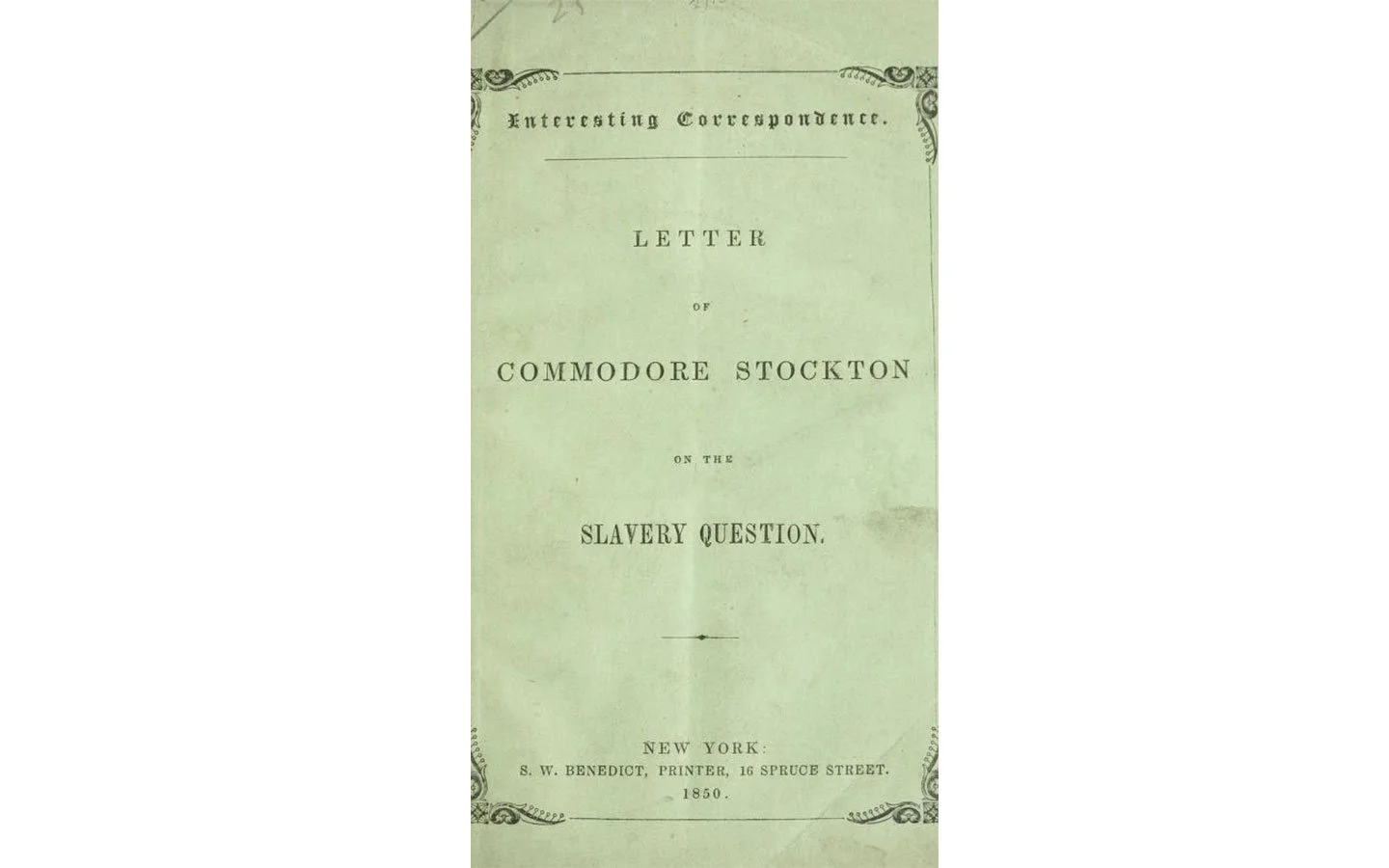View of the Colonial Settlement at Cape Montserado, June 1825. Drawn and engraved by Henry Stone. Collection of the Library of Congress. This view shows Cape Montserado (or Mesurado) four years after Stockton had confronted Zolu Duma. The accompanying legend marks the round tower as “Stockton Castle” named for the Commodore. The American Colonization Society had powerful white supporters including Henry Clay, Francis Scott Key, and James Madison—all of whom enslaved people. Its efforts were supported by President Monroe and, by 1867, 13,000 free Black people had emigrated to Liberia.
Robert Field Stockton and the American Colonization Society
Founded by Princeton alumni in 1816, the American Colonization Society (ACS) sought the removal of freed slaves to Africa. One of the society’s founding architects, Reverend Robert Finley, had been the Commodore’s teacher at Basking Ridge Classical School. While the society first attracted freed Africans and abolitionists, it evolved as a nativist and racist group seeking to rid the country of freed slaves and to diminish the association of races.
Map of the West Coast of Africa from Sierra Leone to Cape Palmas, including the colony of Liberia, 1830. Surveyed and compiled by J. Ashmun, engraved by J.H. Young, published by A. Finley. Collection of the Library of Congress. Visible is the capital of Liberia, named Monrovia for President Monroe, and Stockton Creek named for the Commodore. One can also make out the land belonging to Zolu Duma, also known as King Peter.
In 1820, Congress granted the ACS use of the U.S.S. Alligator. Aided by influential friends in Washington, Stockton was granted command of the ship. He set sail for the west coast of Africa with the task of securing land for the creation of a successful colony of freed slaves. He identified Cape Mesurado, a strip of land south of Sierra Leone, and forced local Bassa chief Zolu Duma (also known as King Peter) to sell. With this land, ACS founded the colony of Liberia.
Stockton holding a pistol to King Peter’s head, from Thomas Curtis Clarke’s The mission of America...Compiled from official documents by Thomas C. Clarke. Philadelphia, S.C. Paul & Co., 1852. Collection of Yale University, Beinecke Rare Book and Manuscript Library. This scene was written as a heroic chapter in the first campaign biography of the Commodore, written by his cousin, “Captain Stockton...drawing one of his pistols, pointed at the head of the king, while raising his other hand to heaven, he solemnly appealed to the God in Heaven for protection...King Peter flinched before the calm courage of the white man...” The account is undoubtedly embellished and heavily imbued with the new rhetoric of manifest destiny—the belief that God blessed the growth and expansion of the nation.
In 1824, the New Jersey Colonization Society was chartered and Stockton was chosen to serve as its first president. Founding members included his father, the Duke, father-in-law John Potter, and important faculty at Princeton University. Stockton opened the inaugural meeting denouncing the evils of slavery while simultaneously lambasting the African race, “That vast continent is said to contain fifty millions of Inhabitants; whose pleasures are sloth, and idleness; their employments, rapine and murder...that immense population, vitiated and debased by the most profound ignorance, and unrestrained barbarism.”
Proceedings of a meeting held at Princeton, New-Jersey, July 14, 1824
“To civilize this degenerate people [of Africa], to change their ignorance into knowledge, their horrible superstition into a right understanding of the Christian Religion, their treachery into good faith, and their slothfulness into industry, are among the results contemplated by the proposed Plan of the American Colonization Society.”
—ROBERT FIELD STOCKTON, ADDRESSING THE NEW JERSEY COLONIZATION SOCIETY, JULY 14,1824
Letter of Commodore Stockton on the Slavery Question, 1850.
In 1850, in response to a letter from his friend Daniel Webster (1782–1852), Stockton published Letter of Commodore Stockton on the Slavery Question. In it, Stockton grapples with the nation's, and his own, contradictory views on slavery. Ultimately he blames the practice of US slavery on the British and God.
Land Contract for Liberia
In 2021, Liberian historian C. Patrick Burrowes uncovered the original land purchase agreement, signed by then-Captain Stockton, Eli Ayres (an agent of the ACS) and six African leaders, including King Peter. The two-page document details the sale of the tract of 140 acres of West African land that later became the Liberian capital, Monrovia, for $300 worth of weapons, rum and other items. Missing since 1835, this land contract shows formal approval of the land sale from 6 African signatories: King Peter, King George, King Zoda, King Long Peter, King Governor, and King Jimmy—all of whom signed with an “X.”
The missing document was found in the papers of Elias Boudinot Caldwell (1776–1825), a secretary of ACS, and the namesake and adopted child of Stockton’s great-uncle Elias Boudinot (1740–1821). Note the towns of Stockton and Caldwell on the map at the top of this page.
Cape Mesurado land contract, December 15, 1821.
Courtesy of Chicago History Museum. The second page of the document (seen here) includes the signatures of Captain Robert F. Stockton and six leaders of Dei, Bassa, Vai, and Gola people. Click the source button below to see the full document.





